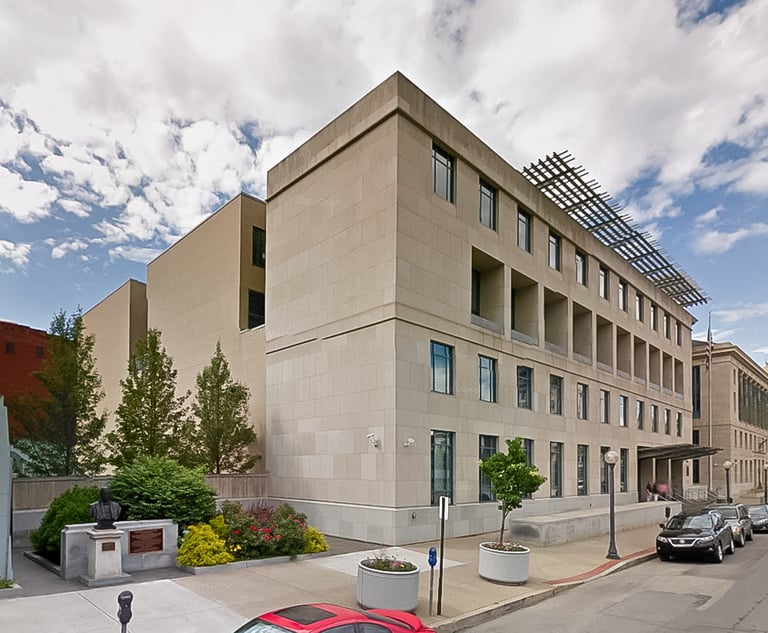Convicted Sex Criminal Allowed to Resume Teaching at Lock Haven, Court Rules
Lock Haven University has been ordered to rehire a mathematics professor who was fired after the college discovered he had been convicted of sex crimes nearly 30 years ago.
September 05, 2018 at 07:29 PM
3 minute read
 Photo credit: Bigstock
Photo credit: Bigstock
Lock Haven University has been ordered to rehire a mathematics professor who was fired after the college discovered he had been convicted of sex crimes nearly 30 years ago.
The Commonwealth Court upheld an arbitrator's ruling that the professor, unnamed in the court's opinion over privacy concerns, should be reinstated to teach classes to all students except high school students enrolled in college classes.
Though the opinion did not identify the professor, federal court records show that Charles Morgan filed a lawsuit against Lock Haven over his firing, which said that in 1989, when he was 19 years old, Morgan was convicted of sexual abuse in Kentucky and sentenced to prison. According to Commonwealth Court Senior Judge James Gardner Colins' opinion, Morgan was charged with performing oral sex on an 8-year-old-boy and engaged in “another unspecified sexual act with another minor.”
Morgan's attorney in the Commonwealth Court case, James L. Cowden, did not return a call seeking comment. Brian P. Gabriel, who represents the Pennsylvania State System of Higher Education and Lock Haven, also did not return a call seeking comment.
After completing his five-year prison sentence, Morgan earned a bachelor's degree and later a Ph.D in mathematics and was hired by Lock Haven in 2004, according to Colins. Morgan's conviction was discovered through a series of background checks mandated by the Child Protective Services Law—enacted in 2014 in the wake of child sex abuse scandal at Penn State.
When Morgan was hired, he was asked whether he had been convicted of any crimes in the previous 10 years. He argued that because he gave an honest answer, no, he should not have been fired. He also argued that he was exempt from the background checks because he did not have extensive contact with children, such as dual-enrolled high school students, while teaching at Lock Haven.
The arbitrator sided with Morgan, “holding that the preponderance of evidence showed that [Morgan's] youthful criminal acts had not followed him into middle age,” according to Colins, who was joined in the opinion by Judges Anne Covey and Michael Wojcik. The arbitrator also allowed for Morgan to be exempt from teaching high school-age students enrolled at the University, instead handling upper level and graduate classes.
PASSHE claimed that the arbitrator's ruling flew in the face of the public policy interest in protecting children.
Colins looked to a legal test consisting of three parts to come to a solution; first, identifying the conduct; second, determining whether the conduct implicates well-defined public policy; and third, determining whether the arbitrator's award poses an “unacceptable risk” that would undermine the policy.
“We conclude that the arbitrator's award here reinstating grievant [Morgan] to his position as a faculty member at Lock Haven with the qualification that he would no longer teach in classes or programs that admit dual-enrolled students did not violate public policy,” Colins said.
The judge continued, “The arbitrator found that various mitigating factors existed that militated against grievant's dismissal, including the fact that over 25 years had elapsed since grievant's crime, his relatively young age at the time of the incident, the fact that he completed a voluntary sexual offender program, and the fact that after being released from prison he completed two advanced degrees at other universities while serving as a tutor and supervisor of graduate students.”
Colins said that the chance of Morgan relapsing and committing a similar crime was “remote.”
This content has been archived. It is available through our partners, LexisNexis® and Bloomberg Law.
To view this content, please continue to their sites.
Not a Lexis Subscriber?
Subscribe Now
Not a Bloomberg Law Subscriber?
Subscribe Now
NOT FOR REPRINT
© 2025 ALM Global, LLC, All Rights Reserved. Request academic re-use from www.copyright.com. All other uses, submit a request to [email protected]. For more information visit Asset & Logo Licensing.
You Might Like
View All
Middle District of Pennsylvania's U.S. Attorney Announces Resignation
2 minute read
High Court Revives Kleinbard's Bid to Collect $70K in Legal Fees From Lancaster DA
4 minute read
Immunity for Mental Health Care and Coverage for CBD: What's on the Pa. High Court's November Calendar
5 minute read
Slip-and-Fall Suit Cleared to Proceed Against Kalahari Indoor Waterpark
3 minute readTrending Stories
- 1South Florida Attorney Charged With Aggravated Battery After Incident in Prime Rib Line
- 2'A Death Sentence for TikTok'?: Litigators and Experts Weigh Impact of Potential Ban on Creators and Data Privacy
- 3Bribery Case Against Former Lt. Gov. Brian Benjamin Is Dropped
- 4‘Extremely Disturbing’: AI Firms Face Class Action by ‘Taskers’ Exposed to Traumatic Content
- 5State Appeals Court Revives BraunHagey Lawsuit Alleging $4.2M Unlawful Wire to China
Who Got The Work
J. Brugh Lower of Gibbons has entered an appearance for industrial equipment supplier Devco Corporation in a pending trademark infringement lawsuit. The suit, accusing the defendant of selling knock-off Graco products, was filed Dec. 18 in New Jersey District Court by Rivkin Radler on behalf of Graco Inc. and Graco Minnesota. The case, assigned to U.S. District Judge Zahid N. Quraishi, is 3:24-cv-11294, Graco Inc. et al v. Devco Corporation.
Who Got The Work
Rebecca Maller-Stein and Kent A. Yalowitz of Arnold & Porter Kaye Scholer have entered their appearances for Hanaco Venture Capital and its executives, Lior Prosor and David Frankel, in a pending securities lawsuit. The action, filed on Dec. 24 in New York Southern District Court by Zell, Aron & Co. on behalf of Goldeneye Advisors, accuses the defendants of negligently and fraudulently managing the plaintiff's $1 million investment. The case, assigned to U.S. District Judge Vernon S. Broderick, is 1:24-cv-09918, Goldeneye Advisors, LLC v. Hanaco Venture Capital, Ltd. et al.
Who Got The Work
Attorneys from A&O Shearman has stepped in as defense counsel for Toronto-Dominion Bank and other defendants in a pending securities class action. The suit, filed Dec. 11 in New York Southern District Court by Bleichmar Fonti & Auld, accuses the defendants of concealing the bank's 'pervasive' deficiencies in regards to its compliance with the Bank Secrecy Act and the quality of its anti-money laundering controls. The case, assigned to U.S. District Judge Arun Subramanian, is 1:24-cv-09445, Gonzalez v. The Toronto-Dominion Bank et al.
Who Got The Work
Crown Castle International, a Pennsylvania company providing shared communications infrastructure, has turned to Luke D. Wolf of Gordon Rees Scully Mansukhani to fend off a pending breach-of-contract lawsuit. The court action, filed Nov. 25 in Michigan Eastern District Court by Hooper Hathaway PC on behalf of The Town Residences LLC, accuses Crown Castle of failing to transfer approximately $30,000 in utility payments from T-Mobile in breach of a roof-top lease and assignment agreement. The case, assigned to U.S. District Judge Susan K. Declercq, is 2:24-cv-13131, The Town Residences LLC v. T-Mobile US, Inc. et al.
Who Got The Work
Wilfred P. Coronato and Daniel M. Schwartz of McCarter & English have stepped in as defense counsel to Electrolux Home Products Inc. in a pending product liability lawsuit. The court action, filed Nov. 26 in New York Eastern District Court by Poulos Lopiccolo PC and Nagel Rice LLP on behalf of David Stern, alleges that the defendant's refrigerators’ drawers and shelving repeatedly break and fall apart within months after purchase. The case, assigned to U.S. District Judge Joan M. Azrack, is 2:24-cv-08204, Stern v. Electrolux Home Products, Inc.
Featured Firms
Law Offices of Gary Martin Hays & Associates, P.C.
(470) 294-1674
Law Offices of Mark E. Salomone
(857) 444-6468
Smith & Hassler
(713) 739-1250





